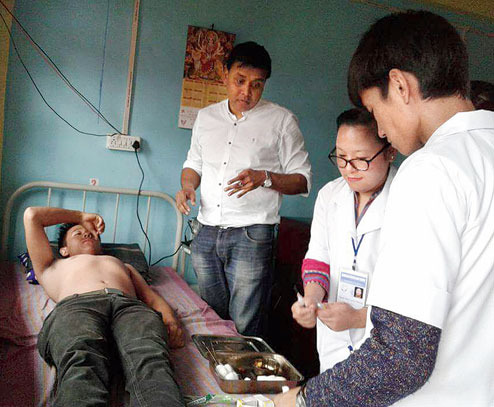
Darjeeling :
An idea that bagged an award from the Acadèmia de Ciències Mèdiques, a forum of healthcare professionals in Barcelona, Spain, has blossomed into a fruitful project that is saving human lives in one of the farthest corners of Darjeeling district in Rimbick.
Plaban Das, a medical director of Planter’s Hospital in Darjeeling, during his advanced medical studies at La Santpau hospital in Barcelona, had through his Spanish friends proposed an idea in 2009 to create a satellite healthcare unit in remote areas.
The idea we bagged the Beques de Cooperacio Academia del Mon award that carried a prize money of 200 Euros in 2009.
“Anna Goma, a Spanish doctor, has presented the idea to the academy and it bagged the first prize. It was just an idea then and wanted to replicate the same in Rimbick, where I had conducted a medical camp in 2007,” said Das.
He mulled over the idea for long and once social media, more particularly WhatsApp, became common among people, he started working on the project.
“The basic idea was to ensure the people of Rimbick and its surrounding areas quick medical intervention during emergencies so that lives could be saved,” said Das.
Rimbick is about 90km from Darjeeling and one has to trek 6-7km further to reach the villages of Srikhola and Daragoan.
“With the help of local people, we formed a 12-member committee and set up the Rimbick Singalila Health Care Centre, a no-loss-no-profit venture which was inaugurated on September 13, 2015,” said Das.
Das made a personal contribution of Rs 2.5 lakh, along with the prize money of 100 Euros (the remaining 100 Euros was used in a project in Nigeria), while local people contributed around Rs 1 lakh. “Dr Hem Gosai, who practices in London but is from Darjeeling, later contributed Rs 1 lakh when he heard about the project,” said Das.
Two nurses, one para-medic and two technicians run the two-bedded centre at Rimbick with ECG, X-ray machine, nebuliser, oxygen cylinder and lab equipment.
“Whenever there is an emergency, the nurses contact me through WhatsApp. Primary tests are done there and they send the report on Whatsapp to me. Then I prescribe preliminary treatment right away, which is important in cases like brain stroke and heart attacks,” said Das.
Prakash Gurung, GTA Sabha member of the area, has also donated an ambulance to the centre.
In fact, this year, the centre observed a Stroke Survival Day, where five patient who had become paralytic and fully recovered because of immediate medical intervention were felicitated.
Shiva Rai, a hotelier, said: “I would not have been speaking to you had the centre not been there. I had gone to bed normally but in the morning, I found that my hands were paralytic and my face slanted. I could recover fully because of immediate medical intervention.
Binod Kumar Rai, a teacher of Rimbick Higher Secondary School, said: “I had a bee sting followed by fever and diarrhea. I recovered immediately. Importantly, my relative who had a stroke also recovered well.”
The centre needs Rs 30,000 on an average a month to function. “They charge a minimum amount. If we were to go and meet Dr Das in Darjeeling we need to spend anything between Rs 2000 to Rs 3000. But treatment is much cheaper and efficient at the Rimbick centre,” said Binod.
Das, along with other doctors visit the centre, once a month. A group of doctors from Zion Hospital in Nagaland held a free medical camp on February 15 there.
“People from Nepal also visit the centre now,” said Das.
Apart from the Spanish doctor, Anna, Martha Gallego, a nurse, Pau Casan Bonet, a pianist, and Begonya Crespo Bosque held a musical event in Barcelona to support the centre.
A similar project is being worked out for Badamtam tea garden, about 20km from Darjeeling.
source: http://www.telegraphindia.com / The Telegraph,Calcutta,India / Front Page> North Bengal> Story / by Vivek Chhetri / Monday- February 20th, 2017